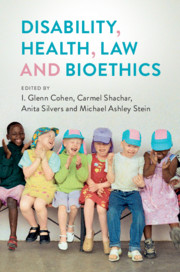Book contents
- Disability, Health, Law, and Bioethics
- Disability, Health, Law, and Bioethics
- Copyright page
- Dedication
- Contents
- Notes on Contributors
- Introduction
- Preface
- Acknowledgments
- Part I Disability: Definitions and Theories
- Part II Disability in the Beginning and the End of Life
- Part III Disability in the Clinical Setting
- Part IV Equality, Expertise, and Access
- Introduction to Part IV
- 11 Making “Meaningful Access” Meaningful: Equitable Healthcare for Divisive Times
- 12 The Privacy Problem in Disability Antidiscrimination Law
- 13 Sexual Agency As a Rights-Based Imperative for Persons with Intellectual Disabilities
- Part V Disability, Intersectionality, and Social Movements
- Part VI Quantifying Disability
Introduction to Part IV
from Part IV - Equality, Expertise, and Access
Published online by Cambridge University Press: 08 April 2020
- Disability, Health, Law, and Bioethics
- Disability, Health, Law, and Bioethics
- Copyright page
- Dedication
- Contents
- Notes on Contributors
- Introduction
- Preface
- Acknowledgments
- Part I Disability: Definitions and Theories
- Part II Disability in the Beginning and the End of Life
- Part III Disability in the Clinical Setting
- Part IV Equality, Expertise, and Access
- Introduction to Part IV
- 11 Making “Meaningful Access” Meaningful: Equitable Healthcare for Divisive Times
- 12 The Privacy Problem in Disability Antidiscrimination Law
- 13 Sexual Agency As a Rights-Based Imperative for Persons with Intellectual Disabilities
- Part V Disability, Intersectionality, and Social Movements
- Part VI Quantifying Disability
Summary
The troika of chapters in this Part demonstrates, in dissimilar contexts and in varied ways, the deleterious effects of clumsily applying, misconstruing, or violating disability-based civil rights laws. Underlying and uniting the three chapters is the impact of misunderstanding disability as an identity category and a subject of normative social justice. Stated more in line with the book’s theme and its Introduction, these contributions highlight some of the real-world manifestations of viewing disability as deficit rather than as difference.
- Type
- Chapter
- Information
- Disability, Health, Law, and Bioethics , pp. 143 - 146Publisher: Cambridge University PressPrint publication year: 2020

